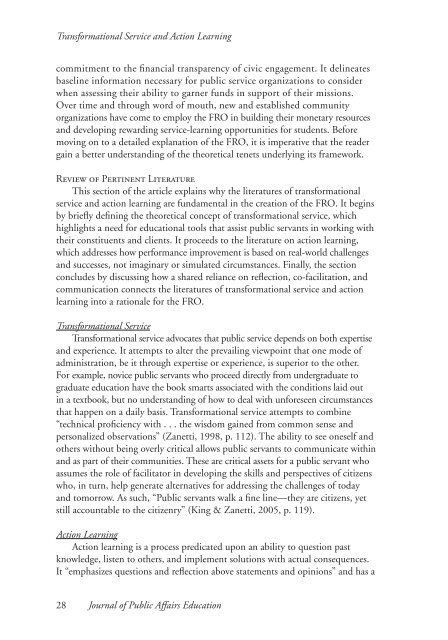Journal of Public Affairs Education
You also want an ePaper? Increase the reach of your titles
YUMPU automatically turns print PDFs into web optimized ePapers that Google loves.
Transformational Service and Action Learning<br />
commitment to the financial transparency <strong>of</strong> civic engagement. It delineates<br />
baseline information necessary for public service organizations to consider<br />
when assessing their ability to garner funds in support <strong>of</strong> their missions.<br />
Over time and through word <strong>of</strong> mouth, new and established community<br />
organizations have come to employ the FRO in building their monetary resources<br />
and developing rewarding service-learning opportunities for students. Before<br />
moving on to a detailed explanation <strong>of</strong> the FRO, it is imperative that the reader<br />
gain a better understanding <strong>of</strong> the theoretical tenets underlying its framework.<br />
Review <strong>of</strong> Pertinent Literature<br />
This section <strong>of</strong> the article explains why the literatures <strong>of</strong> transformational<br />
service and action learning are fundamental in the creation <strong>of</strong> the FRO. It begins<br />
by briefly defining the theoretical concept <strong>of</strong> transformational service, which<br />
highlights a need for educational tools that assist public servants in working with<br />
their constituents and clients. It proceeds to the literature on action learning,<br />
which addresses how performance improvement is based on real-world challenges<br />
and successes, not imaginary or simulated circumstances. Finally, the section<br />
concludes by discussing how a shared reliance on reflection, co-facilitation, and<br />
communication connects the literatures <strong>of</strong> transformational service and action<br />
learning into a rationale for the FRO.<br />
Transformational Service<br />
Transformational service advocates that public service depends on both expertise<br />
and experience. It attempts to alter the prevailing viewpoint that one mode <strong>of</strong><br />
administration, be it through expertise or experience, is superior to the other.<br />
For example, novice public servants who proceed directly from undergraduate to<br />
graduate education have the book smarts associated with the conditions laid out<br />
in a textbook, but no understanding <strong>of</strong> how to deal with unforeseen circumstances<br />
that happen on a daily basis. Transformational service attempts to combine<br />
“technical pr<strong>of</strong>iciency with . . . the wisdom gained from common sense and<br />
personalized observations” (Zanetti, 1998, p. 112). The ability to see oneself and<br />
others without being overly critical allows public servants to communicate within<br />
and as part <strong>of</strong> their communities. These are critical assets for a public servant who<br />
assumes the role <strong>of</strong> facilitator in developing the skills and perspectives <strong>of</strong> citizens<br />
who, in turn, help generate alternatives for addressing the challenges <strong>of</strong> today<br />
and tomorrow. As such, “<strong>Public</strong> servants walk a fine line—they are citizens, yet<br />
still accountable to the citizenry” (King & Zanetti, 2005, p. 119).<br />
Action Learning<br />
Action learning is a process predicated upon an ability to question past<br />
knowledge, listen to others, and implement solutions with actual consequences.<br />
It “emphasizes questions and reflection above statements and opinions” and has a<br />
28 <strong>Journal</strong> <strong>of</strong> <strong>Public</strong> <strong>Affairs</strong> <strong>Education</strong>



